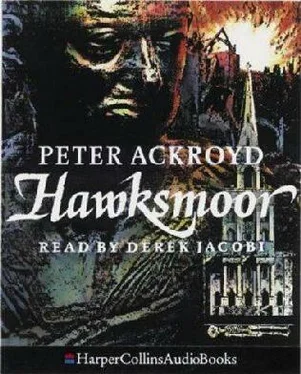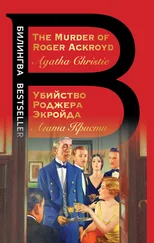He walked into the police station, off Brick Lane, where an Incident Room had been established after the body of Thomas Hill had been found in the abandoned runnel some nine months before. Two or three constables looked up incuriously as he came in, and he made no effort to introduce himself to them; the telephones rang occasionally and one man, smoking furiously, was bent over a typewriter. Hawks- moor watched him for a moment and then sat quietly in the far corner of the room: the open files, the plastic cups lying on the floor, the pieces of official paper pinned casually to a cork board, the discarded newspapers, the telephones ringing again, all of this disorder confused and wearied him. 'Well if you feel up to it,' one young man was saying, 'You could do that. This is true. This is true.' And then his companion answered, 'But it was raining'. Hawksmoor watched them standing together and wondered if there was any connection between the two remarks: he considered the matter carefully as the men moved a few inches backward and forward as they talked, and concluded that there was none. He listened again and he heard the phrases, 'I fell asleep', 'I dreamed' and 'I woke up' -and he repeated to himself the words, 'asleep', 'dreamed' and 'woke' to see if their shape or sound accounted for their position in the sequence which the two men were unfolding. And he saw no reason for them; and he saw no reason for the words he himself used, which came out of him like vomit, which carried him forward without rhyme or meaning. And the lives of these others gripped him by the throat and kept him huddled on his seat.
Then an older man in uniform came up to him saying, 'We were expecting you, sir.'
Hawksmoor suppressed the instinct to rise from his chair in alarm.
That's right. That's why I'm here.'
'Yes, I heard you'd been called in, sir.'
Hawksmoor had noticed before how the older police officers seemed to lose their ability to react, as if they could no longer deal with the reality which they encountered every day; and he decided to test this man a little. The operation,' he asked, 'is it going according to the book?'
'Yes, to the book. It's coming along nicely, sir.'
'But perhaps there is no book in this case, inspector.'
'Well this is true, sir, this is true.'
'I'm glad you know what is true.' Hawksmoor scratched his cheek as he spoke. He was playing a part: he knew this, and believed it to be his strength. Others did not realise that their parts had been written for them, their movements already marked out like chalk lines upon a stage, their clothes and gestures decided in advance; but he knew such things, and thought it better to have chosen. The uniformed officer seemed not to have heard his last remark, and looked blankly at him. And so Hawksmoor went on, 'I'm worried about the time.'
The time? You mean the time now '
'No, the time then, the time of the murder. I have no time.'
That is a question, sir. I'm aware of that -' He took out a cigarette and put it between his lips, letting it hang there without lighting it.
'Yes,' he said, That is a question.'
'And every question has an answer, inspector. Is that true?'
'Yes I suppose you're right there, sir, you're very right there.'
Hawksmoor watched him closely: he wanted him to break down and confess his ignorance, or cry out in bewilderment at the deaths he had seen: anything, so that he might relieve Hawksmoor of his own feelings. But the inspector had now wandered to another desk, starting a desultory conversation with a young constable who shifted from one foot to another as he spoke. Hawksmoor rose and walked out of the room.
A police car drove him through the grey evening until he got out at the corner of Grape Street, near the Seven Dials. He rented a small flat here in an old house beside the Red Gates, a pub which he now passed while lost in his own thoughts; and as he mounted the stairs he considered the steps in the tower of the Wapping Church. He had almost reached his own door when he heard a voice beneath him calling out, 'Cooee! Cooee! It's only me, Mr Hawksmoor! Have you got a minute?' He paused and looked down at his neighbour as she stood in the open doorway, the light from her small hall casting her shadow upon the landing. 'Is it you Mr Hawksmoor? I'm that blind without my glasses.' And he saw her looking at him greedily. There's been a gentleman calling for you.' She fingered the edge of her cardigan which barely concealed the outline of her plump breasts. 'I don't know how he got through that front door. Don't you think it's shocking, Mr Hawksmoor '
That's right, Mrs West. That's quite all right.' He gripped the dusty banister with his right hand. 'Did he say what he wanted?'
'I didn't think it was my place to enquire, Mr Hawksmoor. I said I'm only Mr Hawksmoor's neighbour I'm not his housekeeper and knowing him he wouldn't thank me if I was!' Hawksmoor wondered how well she did know him and, as she laughed, he watched the dark mound of her tongue. And as she laughed she stared at him also; she saw a tall man wearing a dark coat, despite the summer heat, slightly balding but with a moustache darker than was usual in a man of his age. Then he said would you be back? I said I couldn't tell, you don't keep such regular hours. And then he said neither did he.'
Hawksmoor climbed the last stairs. 'I'll see to it, Mrs West. Thank you.'
She took a step out onto the landing in order to watch him before he climbed out of sight. That's all right. I'm always here. I'm not going anywhere, not with my legs, Mr Hawksmoor.'
He opened his door, just enough for him to slide through so that, even if she had craned her neck, she would not be able to see the interior of his flat. Thank you,' he called out before closing the door, 'Good night. Thank you.'
He entered the main room and stood by the window, looking out at the building opposite; he could see shapes there, but then he realised that they were reflections of the house in which he now stood -and he did not know if he was looking out or looking in. The smell of cooking ascended from Mrs West's kitchen, and as he thought of her bent over her plate he could hear vague sounds of shouting and laughter from the Red Gates. And for a moment everything was real: this was how life had always been.
He turned round with a start, thinking he had seen a sudden movement in a corner of the room. There was a convex mirror propped there (it was of the type generally used in shops to deter thieves), and he lifted it up to see if anything had crawled behind it; but there was nothing. He carried the mirror into the centre of the room, and the dust from its edges came off on his fingers; then he held it up against the light of the window and, although he tried to gaze calmly at the reflection, his calmness was broken by the sight of his face staring distended out of the frame with the world itself curved around it. And he could see the same person he had always been -the character which does not age but which remains cautious and watchful, and which stares out with the same intensity. He tried to smile at himself, but the smile would not last. So he remained still until his face became an object like the others swimming in the circle of his gaze -an armchair, a grey carpet, a lamp upon a dark wooden table, a transistor radio placed upon its side, and the bare white walls around all of these things. He put down the mirror. Then he raised his arms above his head and clenched his palms, for it was time to make his visit.
He was about to leave the flat as quietly as he had arrived but then on a sudden instinct he slammed the door and, as he went out into the early evening, he enjoyed the sound which the heels of his shoes made on the pavement. As he walked down St Giles Street he could see two street musicians ahead of him, one of whom was singing a melancholy pop-song while the other begged for money. Hawksmoor recognised the refrain, although he could not remember where he had heard it: I will climb up, climb up, even if I Come tumbling down, rumbling down.
Читать дальше












